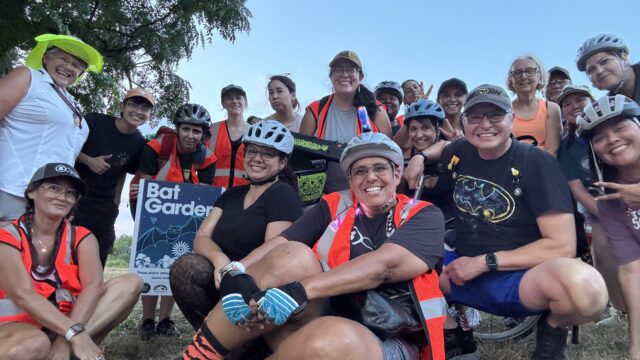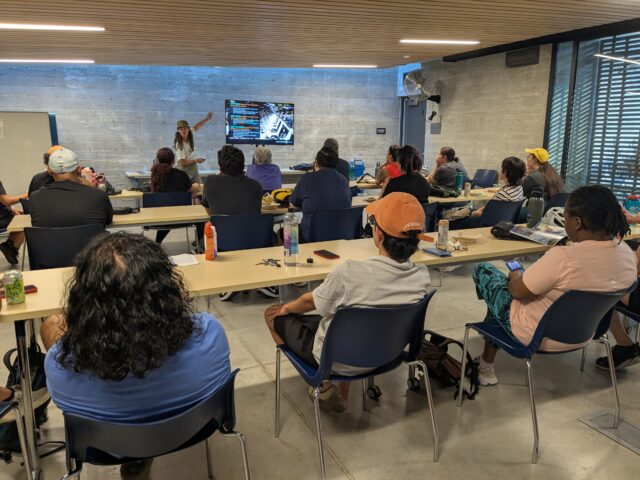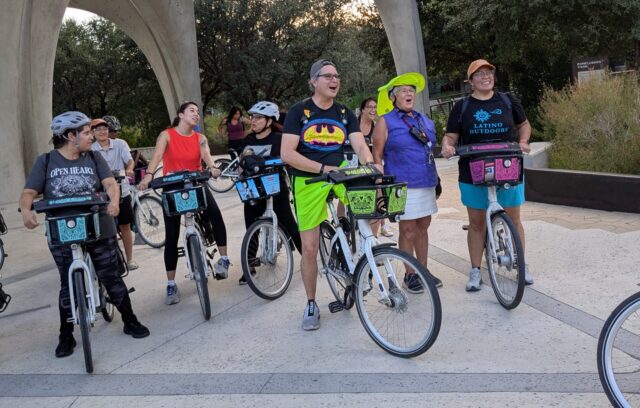Bats Bring New Bike Share Riders in San Antonio
by Odochi Akwani, Writer and Content Manager
September 18, 2025
A project in San Antonio united Latino bikers on a quest to explore the city’s bike share system.

San Antonio is using an unlikely tactic to get more riders on bike share—bats. Through conservation education, Bat Conservation International (BCI) and San Antonio Bike Share hope to encourage expanded bike share access in San Antonio while inspiring environmental leaders.
When we launched our latest mini-grant round earlier this year, San Antonio Bike Share, operated by Bicycle Transit Systems, saw an opportunity to partner with BCI and the San Antonio Chapter of Latino Outdoors again to do a bike share and environmental-focused project. The partners applied and were awarded a grant for their project “Bikeshare Bat Quest,” a four-part educational ride series empowering San Antonio’s Latino community to enjoy the outdoors.
“It seemed like a great way to merge all these partnerships together,” says Erin Cord, community engagement manager at BCI. “For us, it was about trying something new, working with all of our partners that we really love, and continuing to boost our community work in San Antonio, and also promoting a green method of transportation and making it more accessible to people.”
San Antonio Bike Share was interested in the grant after learning last year that they may have to leave the market within the year due to a lack of sustainable funding.
“In response, our operations team stepped up to improve reliability and strategically reduced the system’s footprint to focus on the Mission Reach,” says Alicia Spence-Schlesinger, branding and communications specialist at Bicycle Transit Systems. “This paved nature trail runs along the San Antonio River and connects all four UNESCO World Heritage Missions, the very roots of our city’s history. Surveys conducted by the City of San Antonio Transportation Department for its Bicycle Network Plan confirmed what we were seeing: the Mission Reach had the highest ridership because it offered a safe, protected trail away from vehicle traffic. We immediately recognized this as an opportunity to position bikeshare as the gateway to alternative transportation in San Antonio.”
With that, San Antonio Bike Share created its first class-and-ride platform with a grant from the City’s Office of Sustainability last year, called Bikeshare River Pioneers. Because of its success, they wanted to replicate it with new partners like Bat Conservation International with “Bikeshare Bat Quest.”
The project trained 16 new riders from the San Antonio Chapter of Latino Outdoors to become Bikeshare Bat Quest Ambassadors, who can promote conservation awareness and active transportation and are trained to lead bat education rides. Four San Antonio Bike Share Annual Members became informal bike share ambassadors. The rides began with a bike share training. They helped the Latino Outdoors riders learn how to dock and undock using the app, adjust seat heights, turn on pedal assist, use the bike bell, and shift gears.

“Because participants came primarily to learn about bats, these rides gave us a valuable captive audience to weave in practical bikeshare education,” says Spence-Schlesinger. “We also incorporated different docking stations along the Mission Reach into the rides so participants could see firsthand how easy it is to dock without disrupting their nature exploration.”
Each ride started somewhere different along the Mission Reach Trail along the San Antonio River. The first ride, “Bikeshare Basics & Bat Gardens at Mission San José & The Mission Reach Library Community Garden,” began at Confluence Park, biking to a community garden. The BCI team gave a Bats 101 lesson intro for everyone along with the ride. The second ride ended at Mission San Juan Farm, which is an organic farm run by the San Antonio Food Bank. BCI staff shared how bats are friends to farmers—supporting agriculture and acting as pollinators. For ride number three, participants biked to Tamōx Talōm Community Food Forest to discuss how bats use echolocation to catch prey, and pointed to some of the bat-friendly native plantings BCI has done there. Each of these classes had food samples either pollinated by bats or protected by bats. The last class in the series was the graduation. Participants gathered at the Bracken Cave Emergence, which is the world’s largest bat colony, to watch bats and celebrate the end of the program.

Each participant who completed the series received a free San Antonio Bike Share Annual Membership, a one-year BCI Membership, along with a key fob and helmet. Spence-Schlesinger shared that fobs are especially important in San Antonio because the extreme heat can cause smartphones to overheat and turn off, and the bright sun can make screens hard to read.
“People who go through this program are getting a membership for free, and through this class, they’ll learn how to use the bikes properly and safely,” says Krystie Miner, Bracken Cave Preserve project coordinator at BCI. “They’re also going to see all these bats and nature and food being grown— places they can go on their own anytime. They’re learning about what’s around them.”
___________________________________________________________________________________________
The Better Bike Share Partnership is funded by The JPB Foundation as a collaboration between the City of Philadelphia, the National Association of City Transportation Officials (NACTO), and the PeopleForBikes Foundation to build equitable and replicable bike share systems. Follow us on LinkedIn, Facebook, Twitter, and Instagram, or sign up for our weekly newsletter.
Have a question or a story idea? Email odochi@peopleforbikes.org.
